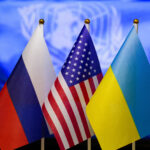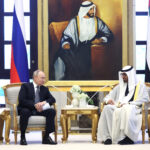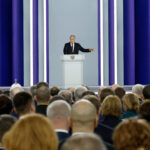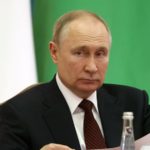“We are obliged to use these difficult moments and really change the structure of the economy” – PM Medvedev
Russia appears to be searching for a silver-lining while its economy struggles from low oil prices, international sanctions and a devalued currency. Prime Minister Dmitry Medvedev told a meeting of candidates to the Supreme and the General Councils of the United Russia party, which Russian President Vladimir Putin leads, that the current price environment should motivate them to implement changes, reports TASS.
“The challenges we face now – if they were not here, we should have probably made them up,” said the prime minister. “Of course, low oil prices, in general hamper us now. But, on the other hand … if the oil prices grow back to their previous level … everyone will relax again.”
If oil prices suddenly regained their strength, policy makers would be able to return to a policy of “leaving well enough alone,” he said.
Medvedev told candidates to Russia’s legislative branch that the country needs to look to export substitution. Russia needs to make products and goods that can compete on international markets, he said. Most of what Russia currently exports are raw materials like oil, iron, precious metals, wood and cereals, but the country also exports some finished products like engines and pumps.
Struggling to withstand low oil prices
With about 50% of the federal budget, 70% of export revenues and 25% of the country’s total GDP coming from energy exports, Russia has been especially vulnerable to the downturn in oil prices. Last month, Russian Finance Minister Anton Siluanov proposed a 10% cut in spending across the board to shore up the budget.
The Kremlin is also considering the sale of stakes in state-owned companies like oil-giant Rosneft, Russian airline Aeroflot and the bank Sberbank, but Putin has set conditions. The Russian president has required that the sales be subject to Russian law, and not offshore entities, reducing the pool of potential buyers substantially. He has also said there would be no fire sale prices, further decreasing the likelihood of attracting a buyer.
Putin also does not seem interested in bolstering small business, according to William Pomeranz, deputy director of the Kennan Institute at the Woodrow Wilson Center for Scholars in Washington. During a recent forum geared at small business, Putin provided no new tax breaks or any relief from double-digit interest rates to small businesses.
Russian bonds also fell for a third straight day today, just ahead of an auction in which the Russian government hopes to raise $318 million through the sale of new debt, reports Bloomberg. The yield on five-year notes jumped seven basis points to 10.47 percent and the rate on 10-year bonds increased seven basis points to 10.33 percent as of 6:15 p.m. in Moscow.






